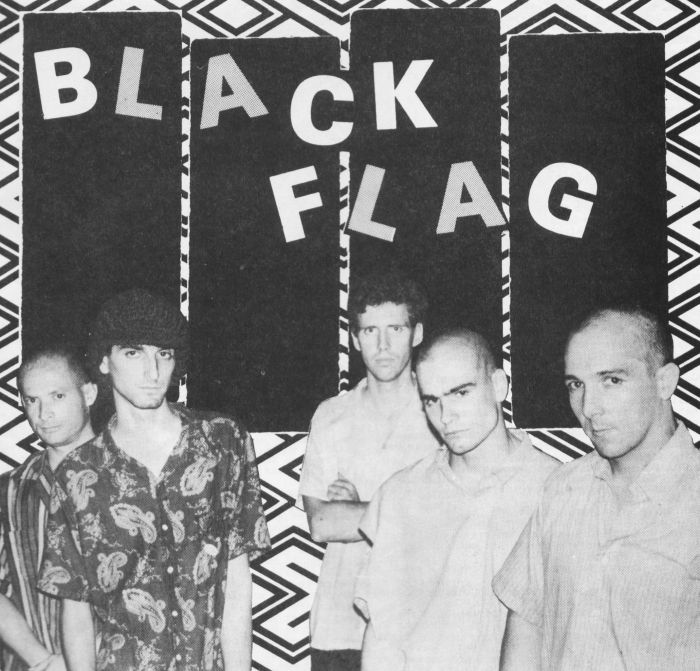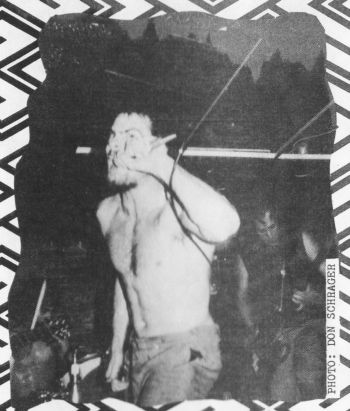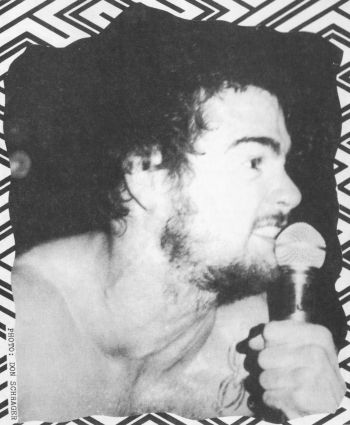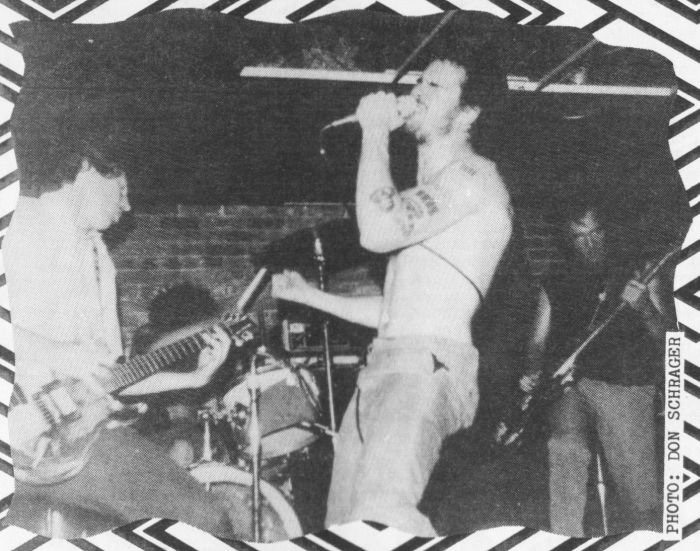
By Boz and David Camp
The following interview, conducted by David Camp and myself, took place outside of Finder's Lounge on the beach. From the band, Greg, Chuck, and Henry Rollins were present. Greg and Chuck did most of the talking while Henry sort of hung out and generally responded only to personal questions.
BOZ: How do our beaches here compare to yours In California?
CHUCK: The water here is saltier. There's no waves. People told me the sharks eat you if you go swimming late at night.
GREG: It's about the same kind as this. Except there's waves and it's not as warm.
DAVID: Musically. Where do you expect to be in 5 years, sound-wise?
GREG: We listen to a lot of different kinds of music. We have a lot of different influences music-wise, and personally, you like to keep doing things that are challenging.
BOZ: Anything in particular?
GREG: Well--we have a whole lot of new songs that we don't play yet 'cause we have a new drummer and we're having enough difficulty getting down what we can play. We're going to be playing some new stuff tonight--I think to answer that question a lot of people expect you to--they say, 'Why aren't you the same? This song isn't like that--Why aren't you like you were?' And if you are like you were you keep thinking and keep challenging yourself, which is what you played initially. It was a challenge then--and if you keep doing that then your music changes and you are the same, really. You're sticking with what you really want to do. And the people that say you're not the same--they want you to stagnate or something like that--I'm not saying everyone says that, but a lot of bands are faced with that.
BOZ: Do you think there's some conformity in the hardcore scene?
GREG: We're trying to always make a statement that it doesn't matter what you're wearing. It's how you feel and how you think.
DAVID: Henry, how do you feel about singing songs like "Six Pack" and stuff since you've never been a big advocate of alcoholism?
HENRY: I don't drink but I'm not anti-drinking.
BOZ: Henry, how does the scene in D.C. compare to the scene in L.A.?
HENRY: In both scenes there are people.
BOZ: How does SOA differ from Black Flag?
HENRY: Song structures are different. Different people in the bands. SOA only had one guitar, Black Flag has two.
BOZ: Maybe on a deeper level--an overall philosophy.
HENRY: I don't know. I think both bands are good. SOA was a real good band.
 GREG: When you asked about differences in philosophy, I don't think there's a BF philosophy or an SOA philosophy. That's what we're really fighting right now. That kind of thing being put on Henry, and us in other ways, and Henry because he comes from D.C., and there's some people in D.C. who believe there's a D.C. philosophy. I would like to think our thinking is more in flux--that we're able to not come in with some philosophy and lay out ideas, and have these be able to change at times.
GREG: When you asked about differences in philosophy, I don't think there's a BF philosophy or an SOA philosophy. That's what we're really fighting right now. That kind of thing being put on Henry, and us in other ways, and Henry because he comes from D.C., and there's some people in D.C. who believe there's a D.C. philosophy. I would like to think our thinking is more in flux--that we're able to not come in with some philosophy and lay out ideas, and have these be able to change at times.
DAVID: How was it in the beginning? There was you and the Germs....
GREG: We weren't punk enough and now we're too punk and now we're not punk enough. I don't know.
BOZ: Do you have any advice to us, in that our scene is just starting?
DAVID: It has been starting for the past year.
GREG: Really, it takes bands, and it helps when we go to places where there's not much happening in the local original music scene. It helps where bands are inspired to do things on their own--maybe look like a band like us or whoever else comes down here, and then that will inspire them not to copy our sound--to do something on their own.
CHUCK: You don't have to be like Bruce Springsteen, Led Zep, or Black Flag.
GREG: We started when we were the only people who had any idea about the sound we were doing and could relate to anything we were doing at all--that's why it took such a long time to build up anything. A more practical thing to do is to put on gigs without age limits, like here the limit is 19 and a lot of places where we play there isn't much choice and we found the places without the age limits getting going alot more.
CHUCK: That is the biggest difference between L.A. and most other places. If you paly a gig that's 21 and over you get 200 people, you play a gig that has all ages and you get more people.
CHUCK: The other thing is to work real agress-ively to get and to keep new people happening...not the same people and the same bands because it's only new people and new ideas that keep things going.
BOZ: You guys have played a lot of different places. Are there any out of the way places that have impressed you outside of the obvious?
CHUCK: I like the bands in Austin, Texas.
GREG: Some of the bands there are real good...the Dicks, MDC moved out of there and the Big Boys are just great.
DAVID: What do you want to express to the audience, what do you want them to get out of the music and the lyrics?
CHUCK: Our feelings.
DAVID: What are your feelings?
CHUCK: Our songs are not saying you should be like this. It's putting our heart on the line.
GREG: It's a lot more complex what we do 'cause it involves an emotional result. You can't just read lyrics, they're designed to be sung. The impact in this is what it is.
DAVID: So, Henry, do you prefer swimming pools or streets for your skateboarding?
HENRY: Streets.
DAVID: Do you like the curve or just straight on the street?
HENRY: Streets and banks. Some that are real cool that you can grind on real hard--alot like killing yourself.
BOZ: On SST, are there any other bands that you will be putting out?
GREG: Meat Puppets' album will be coming out real fast. A Worms single, an Overkill single, and the Minutemen are recording another LP pretty soon.
DAVID: Do you prefer the bands that are slightly different like the Minutemen or Saccharine Trust?
GREG: Any bands that we like. It's not calculated like Overklll, their EP's more conventional--you think of it more in terms of punk rock--it's not indescribable, whereas the Meat Puppets have a more wide range of sounds that's hard to pigeonhole. It kind of reflects our taste!
DAVID: Do you find that hardcore is stagnant, that it gets to a point where people can only play so fast, and they're not going into new areas?
GREG: No, I wouldn't generalize that that is-the thing is happening alot and I see it not happening alot, too. Saccharine Trust - that's healthy. You've got to pick and choose. There is exciting stuff happening.
DAVID: What about Horror rock and the new Satan thing that's been so big all of a sudden. Do you think that's just a reaction against the religious revival?
GREG: Those bands can find a lot of places to play in L.A. cause they're real calm--you get alot of the people who are burned out. They can play at the Whiskey and everyone just drinks their drinks and watches the show. 'Oh, they got a skull I up there!' Order another drink and the club is happy... That's a whole big category and I'm not saying nothing good could come out of it, but some of the bands I find kind of boring!
 BOZ: Why do you guys think you have a lot of problems with the police in L.A. and gigs being shut down?
BOZ: Why do you guys think you have a lot of problems with the police in L.A. and gigs being shut down?
GREG: In L.A. we're really known. Like a house--hold word. I mean anyone that owns a hall, any cop or just about anyone that's heard of Black Flag and they've heard of the stuff that's happened previously, they know of all the wildness that's associated with it and people are very afraid of it and that causes problems with the gigs.
CHUCK: We're very outspoken about their responses to what happened. When the cops go in and break heads... They hate us and we hate them. We didn't go out to do it, it happened to us because we were there. We wound up getting run out of Hermosa Beach.
GREG: The mood in L.A. is very different than most places with the police--because in most areas and around L.A. the police are very militaristic. They don't talk to anyone on a one to one basis, not even regular people. It's a different mood though it's the same thing.
BOZ: What about the Creepy Crawl thing you had a while back--what was behind that?
CHUCK: (Laughs) The Creepy Crawl thing is based on shaking people up. If you shake them up enough then they have to let go of their prejudices to a situation. It comes out of Manson and it's something that Greg's brother Ray brought in and there's a whole lot of people around us that feed into our band and what we do and that was one of his things. It's based on the idea of fear and the adrenalin of fear and at the same time the empowering freedom of it. The person who's all scared and the person who's on top of it and riding that wave of it and that creates an element of uncertainty of everyone there and that was the whole idea--and it did work. We used it in New York and we were able to shake people out of their prejudices toward a band from L.A.--they wanted to say they were better than us--that they had done everything before us and no one could do anything new. 'Obviously these guys suck and I'm going to go there and yawn and see them and tell my friends how they sucked' and I'm going to shake them out of that with that element of fear. Therefore having them on the edge so that they couldn't take it in the way they wanted to. Now they're on our level.
BOZ: What's the reaction been to Henry's new hairstyle?
CHUCK: Where's Black Flag?
GREG: In Atlanta, some guys were saying this isn't the real Black Flag. It turned out real well, it was a real good gig but at first... A lot of people, they try to hold onto something, they've got this style wid they're doing well at it, maybe they're getting laid, getting a little bit of attention, then they have something to hold onto and they don't want it to be taken from them. And they don't want Black Flag to come to town and have something a little different so they can't define themselves so tightly for the rest of their lives.
At this point we stopped the interview--the police were chasing everyone away from the beach and back into the club--some things never change, I suppose.
Understand it
We're fighting a war we can't win
They hate us
We hate them
We can't win
-from "Police Story"
